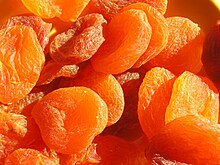


Dried apricots are dried fruit of the apricot tree.
Apricots have been cultivated in Central Asia since antiquity, and dried ones were an important commodity on the Silk Road. They could be transported over huge distances due to their long shelf life. Before the 20th century, they were ubiquitous in the Ottoman, Persian, and Russian Empires.
In more recent times, California was the largest producer, before being overtaken by Turkey, where about 95% of the dried apricot production is provided by the Malatya Province.
Small apricots are normally dried whole. Larger varieties are dried in halves, without the kernel or stone. In the former Soviet Union, the former are known as uryuk (урюк), used primarily for making kompot, and the latter as kuraga (курага). Mediterranean or Turkish varieties of dried apricots are typically dried whole and then pitted; whereas California varieties are halved and pitted before drying.
When treated with sulfur dioxide (SO₂), the color is vivid orange. Organic fruit not treated with sulfur vapor is darker in color and has a coarser texture. Generally, the lighter the color, the higher the SO2 content.
Ethnic foods based on dried apricots include qubani ka meetha in India and chamoy in Mexico.
Dried apricots are an important source of carotenoids (vitamin A) and potassium. Due to their high fiber-to-volume ratio, they are sometimes used to relieve constipation or induce diarrhea. Dried apricots normally do not have any sugar added and have a low glycemic index. The maximum moisture rate allowed in Turkey is 25%.
See also
References
- The Oxford Companion to American Food and Drink (ed. Andrew F. Smith). Oxford University Press, 2007. ISBN 9780195307962. Page 22.
- Esengun, Kemal; Gündüz, Orhan; Erdal, Gülistan (February 2007). "Input–output energy analysis in dry apricot production of Turkey". Energy Conversion and Management. 48 (2): 592–598. doi:10.1016/j.enconman.2006.06.006.
- Консервирование. Большая книга рецептов (in Russian). Litres. 2015-04-22. ISBN 9785457428713.
- "Does Apricot Origin Matter?: Can California and Mediterranean dried apricots be used interchangeably?". Cook's Illustrated. March 2014. Retrieved 7 June 2018.
- Bittman, Mark (2011-12-19). How to Cook Everything Vegetarian: Simple Meatless Recipes for Great Food. Houghton Mifflin Harcourt. ISBN 978-0544186958.
- Ellison, Bronwyn. "About Dried Apricots". LIVESTRONG.COM. Retrieved 2016-05-08.
- Karin Cadwell, Edith White. The Natural Laxative Cookbook. Sterling Pub Co Inc, 1995. ISBN 9780806913445. Page 17.
- Ellison, Bronwyn. "About Dried Apricots". livestrong.com. Retrieved 14 April 2018.
- AgricultureKey. "Turkish Dried Apricot". www.agriculturekey.com. Archived from the original on 2016-03-05. Retrieved 2016-05-08.
External links
 Media related to Dried apricots at Wikimedia Commons
Media related to Dried apricots at Wikimedia Commons
| Azerbaijani cuisine | |
|---|---|
| Beverages |
|
| Breads | |
| Appetizers and salads | |
| Cheeses | |
| Soups |
|
| Dishes | |
| Grilled meats |
|
| Desserts | |
| Ingredients | |
| Instruments | |
| Related cuisines | |